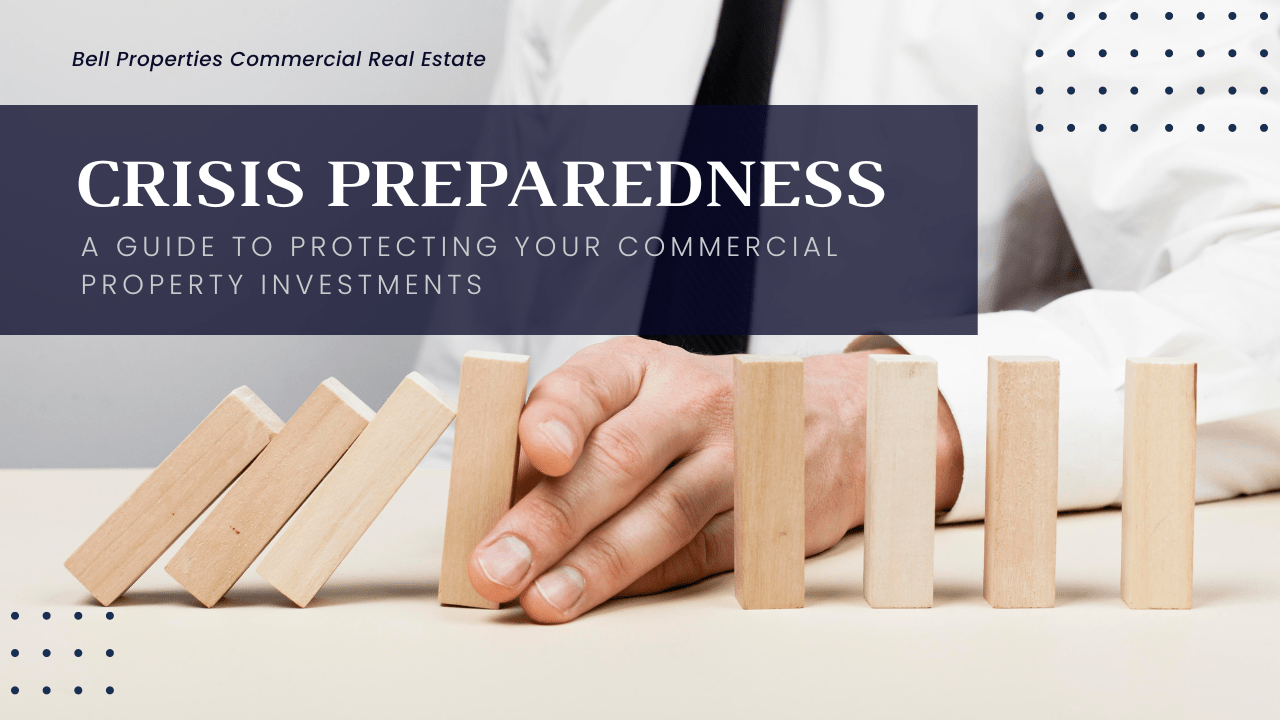Most Southern California commercial real estate investors understand the risks of investing before buying property. As with every investment, there are numerous rewards but also a lot of unknowns. You’ll want to prepare for any potential crisis or emergency, and while protecting the health and safety of your tenants and their customers must be your first priority, you also want to protect your Los Angeles investment property and mitigate any extra loss.
A crisis can occur when you least expect it, threatening the stability and future of your investments. At Bell Properties Commercial Real Estate, we’ve been working with Southern California commercial real estate investors for years to avoid disasters. We’ve put together this strategic guide to provide some important insights into safeguarding your commercial property investments against unforeseen disasters and economic downturns.
Understanding the Risks for Southern California Commercial Real Estate Investments
You can’t protect your investments without knowing which risks are especially possible for commercial investments in Los Angeles.
Understanding the most common risks is essential for investors to make informed decisions and strategize effectively to mitigate potential losses. Here are some of the things you’d be wise to prepare for:
Market Risk
One of the fundamental risks in commercial real estate investment is the potential fluctuations in the market caused by various factors, such as economic downturns, changes in supply and demand, interest rate volatility, and shifts in consumer behavior. For instance, an economic recession can lead to reduced business activity, subsequently affecting the demand for office spaces or retail properties. Online retailers have changed commercial retail space. Remote work trends have impacted the office space market. Stay informed and study market trends and economic indicators so you can anticipate and respond to market risk effectively.
Liquidity Risk
Quickly converting an investment into cash without a significant loss in value can be a bit of a risk in commercial real estate investing. Unlike stocks or bonds, commercial real estate assets are not sold easily or quickly. The process of selling a property can be lengthy and complex, potentially taking months or even years to find a buyer and close a deal. This makes CRE investments inherently less liquid, posing a challenge for investors who may need to access funds on short notice.
Tenant Risks
The performance of commercial real estate investments is heavily reliant on your tenants. Risks arise from turnover, vacancy, and the reliability of tenants. High tenant turnover or prolonged vacancies can lead to loss of income for property owners, while leasing space to tenants with poor credit or questionable financials increase the risk of default on lease payments. Conducting thorough tenant screenings and maintaining diverse tenant mixes can help mitigate these risks.
Environmental and Regulatory Risks
Environmental issues, such as contamination or natural disasters, can pose significant risks to commercial real estate properties, potentially requiring costly remediation efforts or leading to property damage. Additionally, regulatory changes, including zoning laws, building codes, and tax policies, can impact property values and operational costs. Staying ahead of California’s strict environmental requirements and regulatory developments is crucial for managing these risks.
Be prepared for everything from earthquakes to wildfires to floods. Have an emergency plan in place for a plumbing disaster inside of your building, a structural emergency, or a major theft or other criminal act.
Management and Operational Risks
Effective property management is essential to your success. You need reputable, experienced property management in Los Angeles for your commercial properties. Otherwise, you face operational risks including inadequate maintenance, accounting errors, and insufficient capital for property improvements. This can lead to decreased property values, reduced rental income, and higher operational costs. Employing an experienced Los Angeles commercial property management partner and adopting proactive maintenance strategies can help mitigate these risks.
Interest Rate Risk
Interest rate fluctuations can impact commercial real estate investments in several ways. Rising interest rates can lead to higher borrowing costs for investors who rely on financing to purchase properties. Additionally, as interest rates increase, the attractiveness of alternative investments, such as bonds, may rise, potentially leading to a decrease in property values. An understanding of interest rate trends and sound financial planning are essential for managing this risk.
The key in preparing for these types of crises is not just to react to them but to anticipate them as much as possible.
Establishing a Risk Management Plan
A comprehensive risk management plan is your best line of defense. This involves identifying potential risks, evaluating how these risks can affect your property, and outlining strategies to mitigate the worse potential results. Regularly reviewing and updating this plan ensures it remains relevant and comprehensive.
Insurance as a Safety Net
A core component of your risk management plan should be adequate insurance coverage. Property insurance, business interruption insurance, and liability insurance are non-negotiable elements. It's crucial to understand the specifics of your policies, ensuring they cover a wide range of potential crises.
These are the policies every commercial real estate investor should consider.
- Property Insurance
Property insurance covers the physical structure of your commercial property and, depending on the policy, may also include coverage for fixtures, furniture, and other contents against fire, theft, vandalism, and natural disasters. Reviewing the specifics of what’s covered under the policy is critical, as exclusions can vary widely.
Liability Insurance
Liability insurance protects commercial property investors against claims resulting from injuries or damages that occur on their property. This can range from a simple slip-and-fall accident to more complex issues like libel or slander. Given the high costs associated with legal defense and potential settlements, having comprehensive liability insurance in place is non-negotiable.
Business Interruption Insurance
Unpredictable events can disrupt your operations, leading to a loss of income. Business interruption insurance, also known as business income insurance, compensates for lost income during these periods. It’s especially important for investors whose cash flow depends heavily on rental income.
Environmental Liability Insurance
For properties at risk of contamination or located in environmentally sensitive areas, environmental liability insurance offers protection against cleanup costs and third-party claims due to environmental accidents. This includes incidents like hazardous material spills or other pollution-related damages. Given the potential for high-cost remediation and legal complications, environmental coverage is essential for mitigating financial risk. When you’re renting out industrial commercial properties, this type of insurance becomes especially necessary.
Flood and Earthquake Insurance
Standard property insurance policies typically exclude flood damage, making separate flood insurance a critical consideration for properties in flood-prone areas. Managed by the National Flood Insurance Program (NFIP) and also available from private insurers, flood insurance offers protection against property loss due to flooding. Given the increasing occurrence of extreme weather events, evaluating your property’s flood risk and considering adequate coverage is prudent.
In Los Angeles, we’re always wondering when the next earthquake is likely to hit. Earthquake insurance is not legally required, but it’s an excellent way to protect your investment against potential losses due to earthquake damage.
Workers' Compensation Insurance
If you employ staff to manage or maintain your commercial property, workers' compensation insurance is a necessity. It provides benefits to employees who suffer job-related injuries or illnesses. This insurance not only covers medical care and compensation for lost income but also protects property investors from lawsuits by injured workers.
Choosing the right insurance coverage for your commercial property investment involves careful consideration of your specific needs and potential risks. It’s advisable to consult with an insurance professional who can guide you through the process, helping you tailor a comprehensive insurance program that fits your investment profile.
Ongoing Emergency Preparedness
Beyond insurance, physical preparedness is key. For example, in California, structural assessments and improvements to withstand events like earthquakes and floods are an important part of preparing for emergencies. Additionally, having an evacuation or emergency action plan in place for tenants ensures everyone's safety in the event of a disaster.
Leveraging Technology to Monitor and Maintain Properties
Modern technology offers sophisticated tools for crisis monitoring and management. Invest in systems that can alert you to dangers like leaks or unauthorized entry into your building. This can prevent minor issues from escalating into crises. Furthermore, routine maintenance and regular inspections can help identify and address potential problems before they lead to disaster.
Create a Financial Buffer
One of the most practical steps you can take to protect your investments is establishing a financial buffer. This could mean setting aside a portion of your cash flow into an emergency fund specifically designed to cover unexpected expenses or loss of income during crisis periods.
Engaging with Tenants and Community
 Communication is important in times of crisis. Regular updates and an open line of communication with your tenants not only build trust but also ensure that everyone is informed and prepared for any emergency. Being part of a local business community can provide additional support, as sharing resources and information can be invaluable in times of need.
Communication is important in times of crisis. Regular updates and an open line of communication with your tenants not only build trust but also ensure that everyone is informed and prepared for any emergency. Being part of a local business community can provide additional support, as sharing resources and information can be invaluable in times of need.
Protecting your commercial property investments against crises requires foresight, planning, and ongoing effort. By understanding the risks, establishing a comprehensive risk management plan, leveraging technology, maintaining communication, and adapting to new challenges, you can mitigate the impacts of unforeseen events.
At Bell Properties Commercial Real Estate, we specialize in managing commercial properties in Los Angeles. We can help you protect yourself and your investment. Contact our team today.



